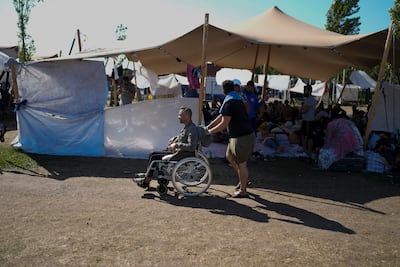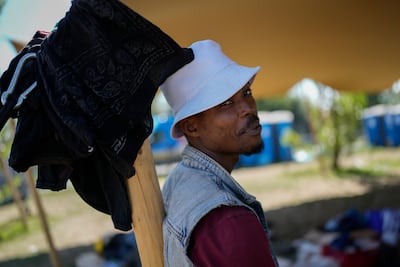Asylum seekers have been forced to sleep outside at an overcrowded camp in the Netherlands where authorities are investigating the death of a baby.
About 700 people have had to sleep outdoors for two nights because the asylum reception centre, with an official capacity of 2,000, did not have space for them.
The Dutch arm of Doctors Without Borders (MSF) sent medics to the tiny village of Ter Apel in the north-eastern Netherlands to give first aid and other assistance.
MSF national director Judith Sargentini said it was the first time the humanitarian group has been called in to assist with a Dutch crisis.
Ms Sargentini compared the situation to overcrowded migrant camps in Greece.
“These are 700 people sleeping rough: no showers, very bad facilities, no health care from the institutions,” she said.

“And it might not be as crowded as on the Greek isles, but if you come here after a long journey as a refugee, you think you find safety, but you find neglect. And you sleep like this. Even if you are healthy, you’ll get sick here.”
She said two people were taken to hospital on Thursday: a man who had a heart attack and another who did not have medication for his diabetes.
It was also reported that a three-month-old baby had died at the camp. Dutch Asylum and Migration Secretary Eric van der Burg said he was “deeply shocked” over the incident and that the cause of death was under investigation.

The majority of people arriving in Ter Apel are Syrians.
Mohammad Ali, a 34-year-old Syrian, arrived at the camp a month ago.
“I’m surprised from the bad conditions here because I didn’t hear about it,” he said. “If I hear it, if I see it before, I will not come here. Because … I think I’m in [a] Middle East country, not in … Holland.”
With temperatures above 30°C on Thursday, migrants lay listlessly on blankets under four canvas shade cloths held up by wooden poles.

Some sheltered in the shadow of a Red Cross station that had Wi-Fi and power for charging phones. Others squabbled as they tried to board a bus to a nearby town.
Blue plastic children’s paddling pools were set up as washing stations and a small row of portable toilets stood near the covered areas.
The government is scrambling to find emergency accommodation for the migrants.


